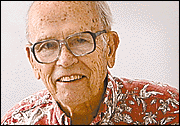


Hawaii’s World
PRESIDENT Clinton seems to have resisted the temptation the 58th Pearl Harbor attack anniversary provided to remove the blame from Adm. Husband Kimmel and Gen. Walter Short for the disaster. Dec. 7 chiefs don’t
merit exonerationI hope he hangs in there despite the strong campaign for them led by Kimmel's son. Anecdotes related to me by a later commanding admiral convince me their only defense was ignorance of the full import of a Nov. 27 war warning from Washington. Given all they did know (or should have known) the defense rings hollow.
They had every reason to know Pearl Harbor could be attacked from the air and to be on guard as proper commanders should.
The person whose anecdotes convinced me is the late Adm. Harry D. Felt, who from 1958 to 1964 was CINCPAC, commander-in-chief of all U.S. forces in the Pacific. We kept up a friendship after he retired to a home in Waialae-Kahala. In a 1982 chat he told me the following:
He was a lieutenant commander in charge of an 18-plane dive bomber squadron in 1941, assigned to the aircraft carrier Lexington based at Pearl Harbor. Seven months before the "real thing" -- in naval maneuvers on Sunday, May 12, the Lexington carried out a successful surprise attack on Pearl Harbor. It caught the fleet in port, just as happened the next Dec. 7, and followed up with a second practice attack on Sunday and another on Monday.
There was no publicity but Kimmel, of course, knew about the attack. He also knew that Lexington had pulled it off by "getting lost" to the south of Oahu, then returning to strike from 200 miles north of Oahu.
PBY flying boats had been flying patrols out of Oahu in all directions to be alert for possible intruding ships or submarines or planes but were told in December 1940 to limit operations to southern sectors only, that northern patrols were unnecessary. The Lexington's surprise attack of Sunday, May 12, 1941, took advantage of this but Kimmel did not restore the patrols. Felt surmised he must have believed any attack would come from the Japanese-held Marshall Islands to the southwest.
A few weeks before Dec. 7, Felt attended a meeting at the naval base presided over by Kimmel, who focused on small-ship operations in his remarks and did not say a word about aviation.
In a 1940 encounter with the Army Air Corps, surprise was expressed at the naval aviation policy of practice firing at sleeves towed through the sky by another plane. The Army Air Corps then had no air-to-air target practice. It focused entirely on strafing of ground targets.
OTHER records, not alluded to by Felt, show that Short, who controlled the Army air assets, protected his planes from sabotage by gathering squadrons together. That made them easier to strafe from the air.
He also deployed just one air defense radar even though six were available. A colleague who was with Short the night of Dec. 6 told me Short remarked, "Wouldn't that make a wonderful target?" as they drove by the brightly lighted ships in Pearl Harbor.
Other records also show Kimmel did not restore patrols to the north even after learning in November 1941, that the Navy had lost track of Japan's aircraft carriers.
The Lexington was at sea on Dec. 7, 1941. When it returned to a blacked-out Pearl Harbor on Dec. 13 to refuel, Felt was angered at the despondence and destruction he believed might have been minimized or avoided by leaders conscious of danger from the air.
The flawed leadership we had does not deserve exoneration.
A.A. Smyser is the contributing editor
and former editor of the the Star-Bulletin
His column runs Tuesday and Thursday.